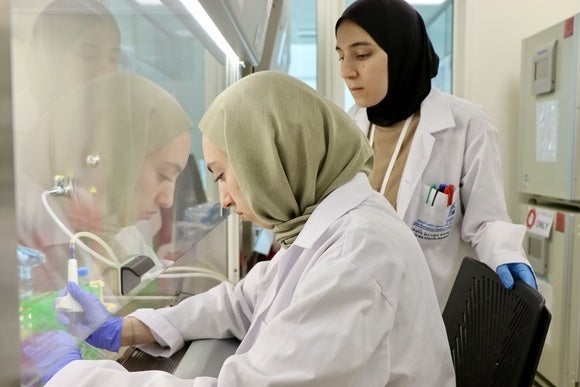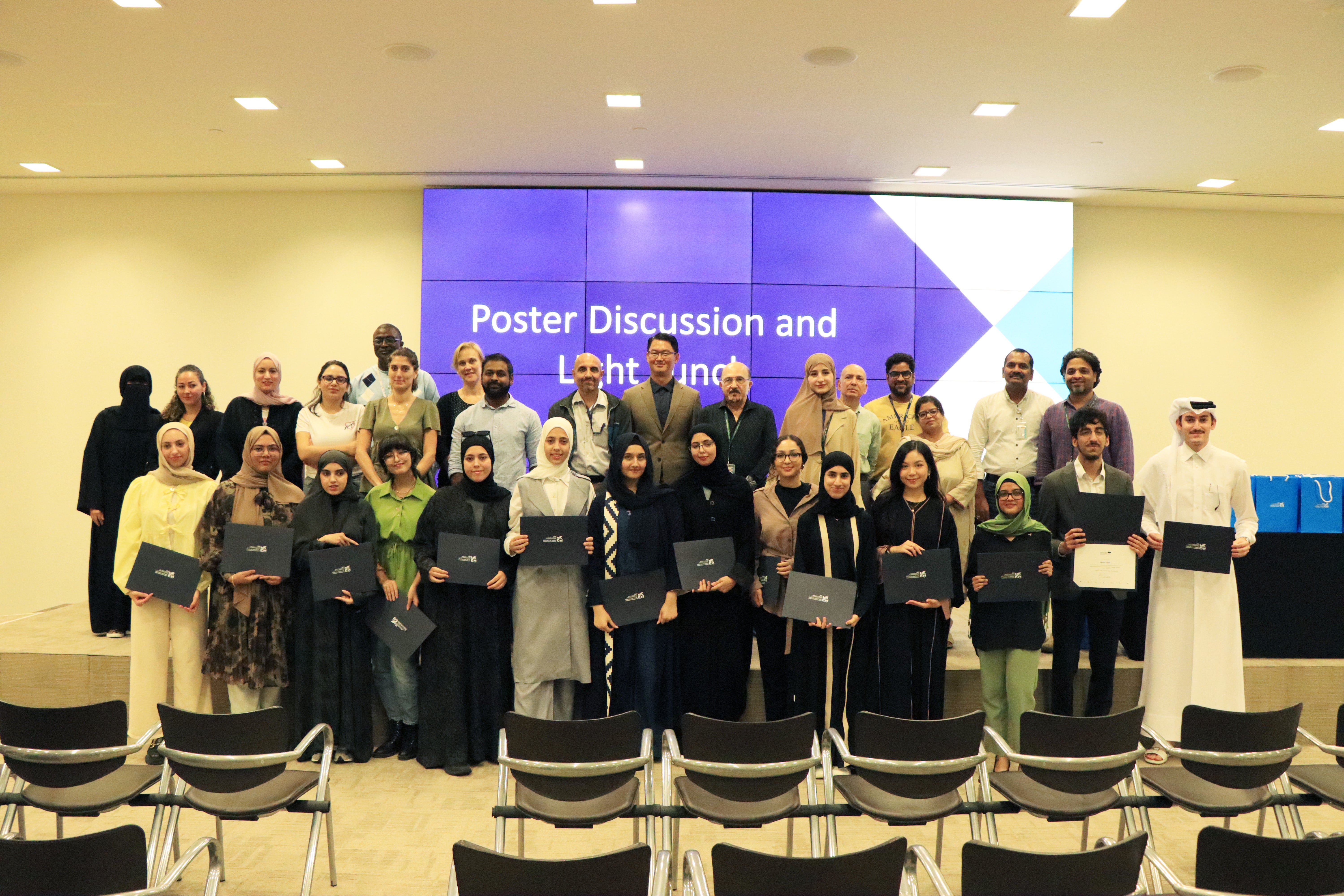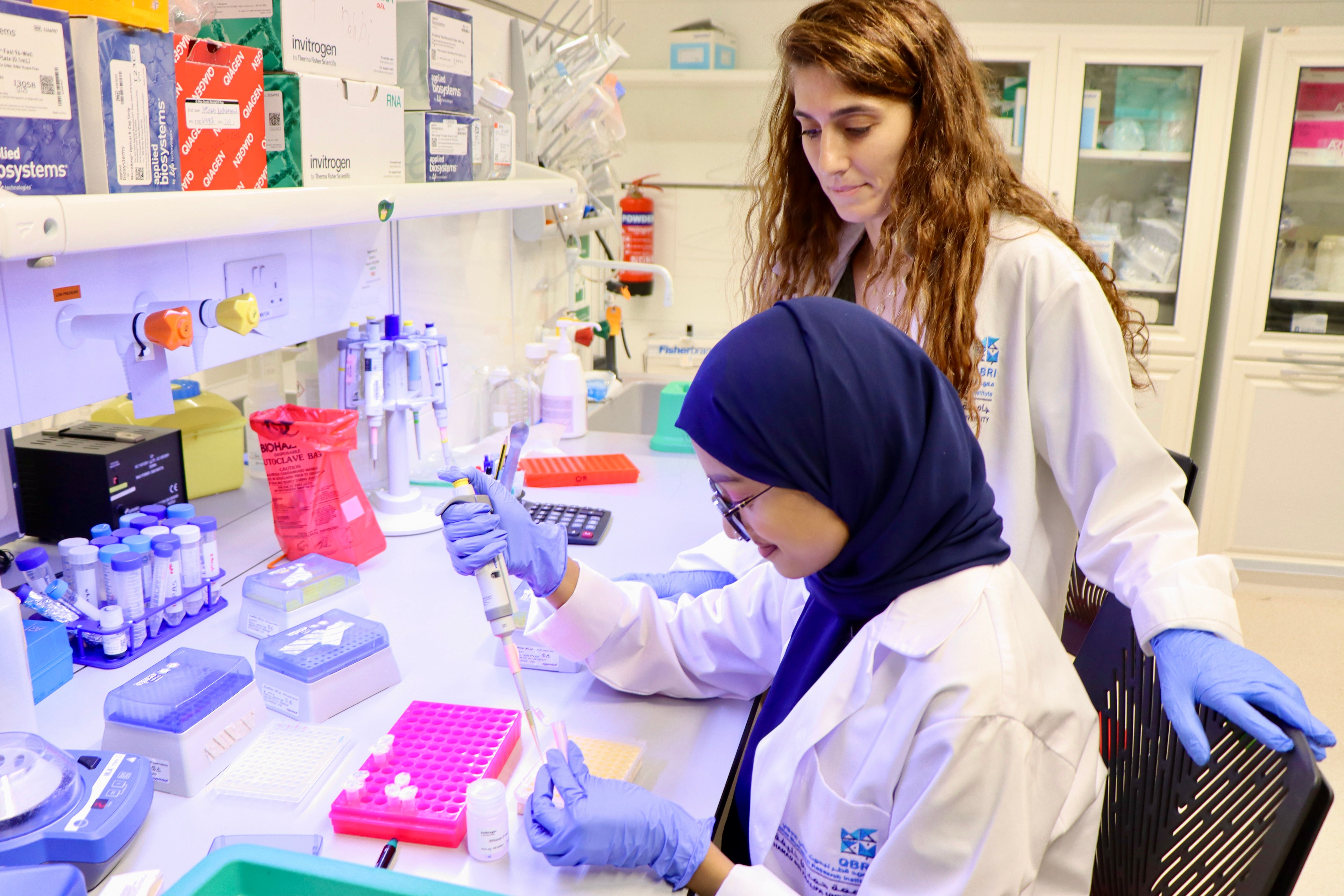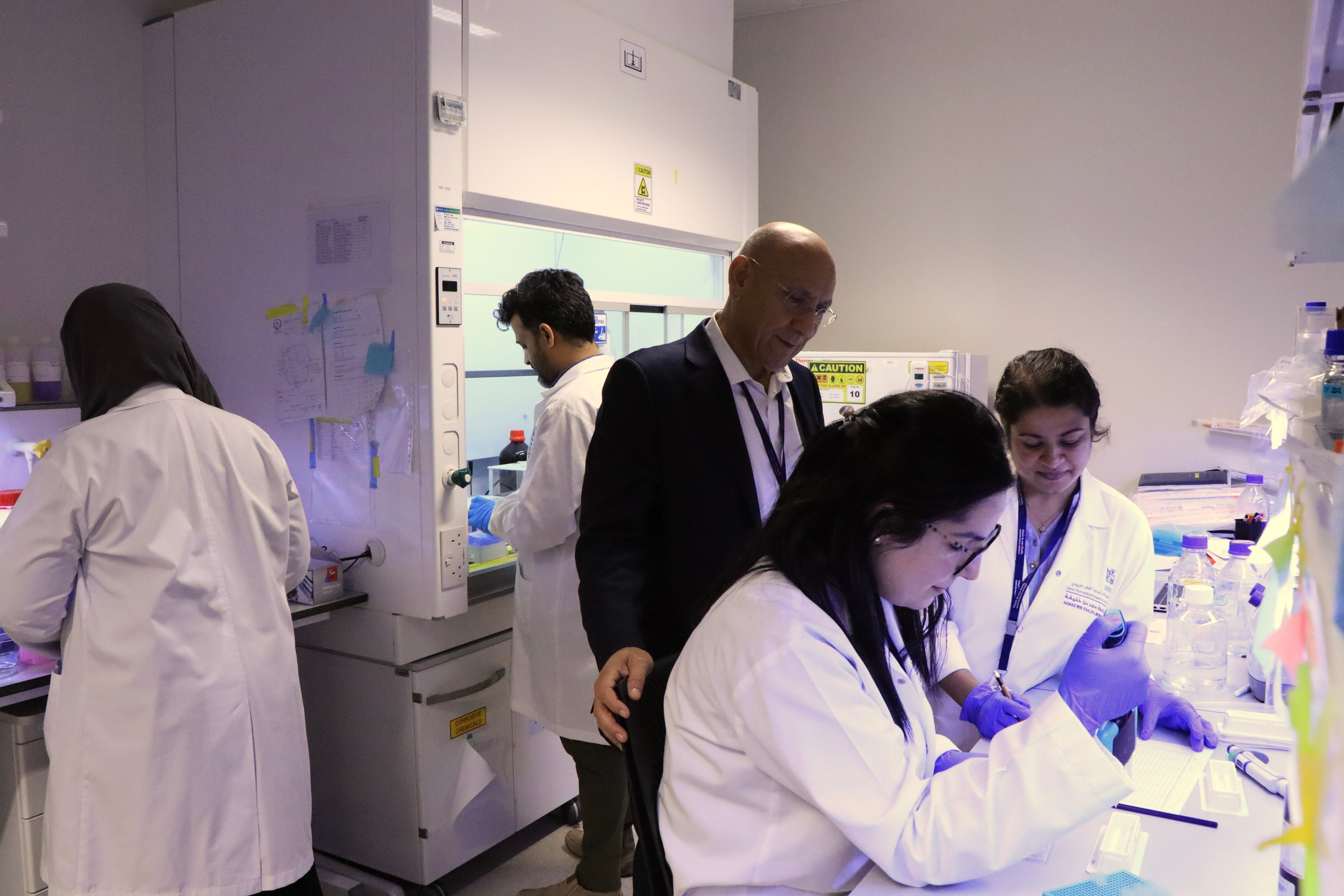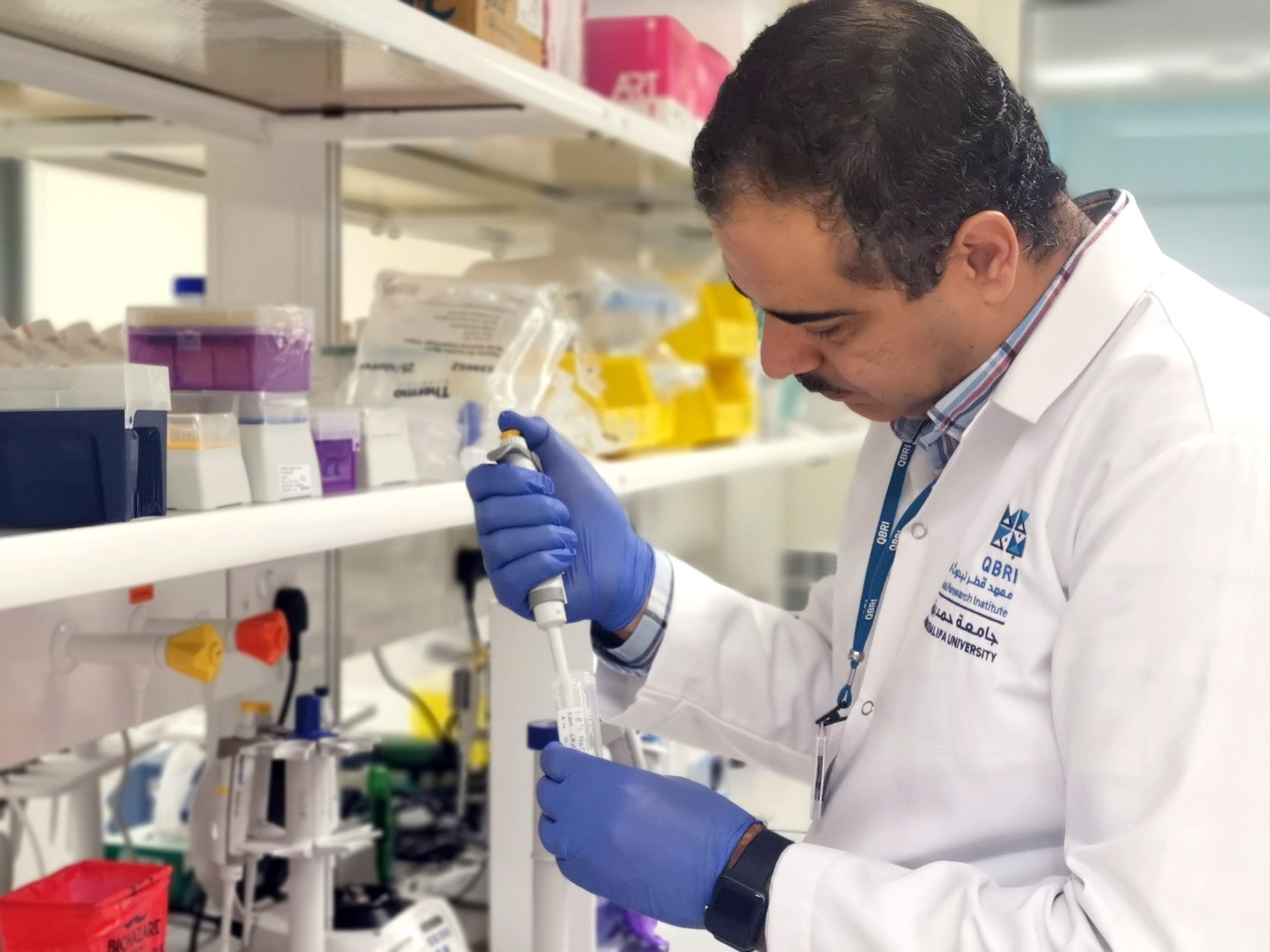
HBKU’s QBRI Refutes Consanguinity as Risk Factor for Autism
Qatar-based study reveals no significant association between marrying within family and ASD

A recent study conducted by Hamad Bin Khalifa University’s (HBKU) Qatar Biomedical Research Institute challenges existing beliefs about consanguinity, the practice of marrying within the family, and its association with Autism Spectrum Disorders (ASD). Despite previous studies suggesting a potential link , this new research, based on data from Qatar, indicates otherwise.
Published in the Journal of Autism and Developmental Disorders, the study involved the collaboration of scientists and researchers from the Cleveland Medical Clinic, and Oregon Health and Science University. The research analyzed information from a national registry and a population-based survey of autism. Dr. Fouad Alshaban and his team at QBRI’s Neurological Disorders Research Center, examined 891 children, both with and without ASD. Contrary to previous studies, the analysis revealed no significant association between parental consanguinity and the risk of ASD. These findings provide a significant contribution to the global study of autism risk factors.
While consanguinity remains a common cultural practice in the Middle East, North Africa, and parts of Asia, the study's results challenge the assumption that it contributes to the prevalence of ASD in these regions. The research team utilized rigorous methods, including multiple logistic regression analyses and comprehensive clinical assessments, ensuring the reliability and accuracy of their conclusions.
The research, based on a substantial sample size and robust methodologies, contradicts previous claims about consanguinity as a risk factor for ASD. This discovery challenges the existing narrative and underscores the need for further research to understand the complex factors influencing ASD prevalence.
QBRI’s study is particularly significant for Gulf countries, where consanguineous unions are common. The lack of association found suggests that consanguinity, while a cultural norm, does not contribute to the risk of ASD in the region. This insight is crucial for families, healthcare professionals, and policymakers, providing them with evidence-based information to make informed decisions.
The research team acknowledged the study's limitations, including missing data on certain variables. Despite these challenges, the study's comprehensive approach and large sample size make it a landmark contribution to the field of autism research.
Commenting on the study, Dr. Fouad Alshaban, Principal Investigator, QBRI, said: “This research not only challenges prevailing beliefs but also highlights the importance of evidence-based studies in shaping our understanding of complex medical conditions like ASD. As the scientific community continues to unravel the mysteries surrounding autism, studies like this one pave the way for more accurate diagnosis, effective interventions, and enhanced support systems for individuals and families affected by the condition. We’re confident that our findings have sparked interest among scientists globally, prompting further exploration into the relationship between consanguinity and ASD in other populations.”
Qatar Biomedical Research Institute (QBRI) is a leading research institute under Hamad Bin Khalifa University (HBKU). The institute addresses the Qatar National Health priorities outlined in the Qatar National Research Strategy through its dedicated research centers – the Cancer Research Center (CRC), Diabetes Research Center (DRC) and Neurological Disorders Research Center (NDRC). For more information, please visit: https://www.hbku.edu.qa/en/qbri
Related News

100-Year Anniversary of the Discovery of Insulin is of Great Relevance to QBRI

Qatar Biomedical Research Institute and Qatar University Scientists Conclude the International Symposium on Role of Glycation in Food-Health-Disease

QBRI Partners with PHCC and QCRI to Combat Prediabetes Through New Screening Tool

QBRI and Sultan Qaboos University Collaborate on Autism Spectrum Disorder Research

HBKU's QBRI Unveils Promising Arabic Stimuli: A Step Forward in Autism Spectrum Disorder (ASD) Diagnosis

Unveiling New Insights into Dementia: Autoantibodies and Blood-Based Biomarkers

Embracing the Colors of the Autism Spectrum: The Importance of Early Intervention and Advocacy

100-Year Anniversary of the Discovery of Insulin is of Great Relevance to QBRI

Qatar Biomedical Research Institute and Qatar University Scientists Conclude the International Symposium on Role of Glycation in Food-Health-Disease

QBRI Partners with PHCC and QCRI to Combat Prediabetes Through New Screening Tool

QBRI and Sultan Qaboos University Collaborate on Autism Spectrum Disorder Research

HBKU's QBRI Unveils Promising Arabic Stimuli: A Step Forward in Autism Spectrum Disorder (ASD) Diagnosis

Unveiling New Insights into Dementia: Autoantibodies and Blood-Based Biomarkers

Embracing the Colors of the Autism Spectrum: The Importance of Early Intervention and Advocacy

100-Year Anniversary of the Discovery of Insulin is of Great Relevance to QBRI

Qatar Biomedical Research Institute and Qatar University Scientists Conclude the International Symposium on Role of Glycation in Food-Health-Disease

QBRI Partners with PHCC and QCRI to Combat Prediabetes Through New Screening Tool

QBRI and Sultan Qaboos University Collaborate on Autism Spectrum Disorder Research

HBKU's QBRI Unveils Promising Arabic Stimuli: A Step Forward in Autism Spectrum Disorder (ASD) Diagnosis

Unveiling New Insights into Dementia: Autoantibodies and Blood-Based Biomarkers

Embracing the Colors of the Autism Spectrum: The Importance of Early Intervention and Advocacy

100-Year Anniversary of the Discovery of Insulin is of Great Relevance to QBRI

Qatar Biomedical Research Institute and Qatar University Scientists Conclude the International Symposium on Role of Glycation in Food-Health-Disease

QBRI Partners with PHCC and QCRI to Combat Prediabetes Through New Screening Tool

QBRI and Sultan Qaboos University Collaborate on Autism Spectrum Disorder Research

HBKU's QBRI Unveils Promising Arabic Stimuli: A Step Forward in Autism Spectrum Disorder (ASD) Diagnosis

Unveiling New Insights into Dementia: Autoantibodies and Blood-Based Biomarkers

Embracing the Colors of the Autism Spectrum: The Importance of Early Intervention and Advocacy

100-Year Anniversary of the Discovery of Insulin is of Great Relevance to QBRI

Qatar Biomedical Research Institute and Qatar University Scientists Conclude the International Symposium on Role of Glycation in Food-Health-Disease

QBRI Partners with PHCC and QCRI to Combat Prediabetes Through New Screening Tool

QBRI and Sultan Qaboos University Collaborate on Autism Spectrum Disorder Research

HBKU's QBRI Unveils Promising Arabic Stimuli: A Step Forward in Autism Spectrum Disorder (ASD) Diagnosis

Unveiling New Insights into Dementia: Autoantibodies and Blood-Based Biomarkers

Embracing the Colors of the Autism Spectrum: The Importance of Early Intervention and Advocacy

100-Year Anniversary of the Discovery of Insulin is of Great Relevance to QBRI

Qatar Biomedical Research Institute and Qatar University Scientists Conclude the International Symposium on Role of Glycation in Food-Health-Disease

QBRI Partners with PHCC and QCRI to Combat Prediabetes Through New Screening Tool

QBRI and Sultan Qaboos University Collaborate on Autism Spectrum Disorder Research

HBKU's QBRI Unveils Promising Arabic Stimuli: A Step Forward in Autism Spectrum Disorder (ASD) Diagnosis

Unveiling New Insights into Dementia: Autoantibodies and Blood-Based Biomarkers

Embracing the Colors of the Autism Spectrum: The Importance of Early Intervention and Advocacy

100-Year Anniversary of the Discovery of Insulin is of Great Relevance to QBRI

Qatar Biomedical Research Institute and Qatar University Scientists Conclude the International Symposium on Role of Glycation in Food-Health-Disease

QBRI Partners with PHCC and QCRI to Combat Prediabetes Through New Screening Tool

QBRI and Sultan Qaboos University Collaborate on Autism Spectrum Disorder Research

HBKU's QBRI Unveils Promising Arabic Stimuli: A Step Forward in Autism Spectrum Disorder (ASD) Diagnosis

Unveiling New Insights into Dementia: Autoantibodies and Blood-Based Biomarkers

Embracing the Colors of the Autism Spectrum: The Importance of Early Intervention and Advocacy

100-Year Anniversary of the Discovery of Insulin is of Great Relevance to QBRI

Qatar Biomedical Research Institute and Qatar University Scientists Conclude the International Symposium on Role of Glycation in Food-Health-Disease

QBRI Partners with PHCC and QCRI to Combat Prediabetes Through New Screening Tool

QBRI and Sultan Qaboos University Collaborate on Autism Spectrum Disorder Research

HBKU's QBRI Unveils Promising Arabic Stimuli: A Step Forward in Autism Spectrum Disorder (ASD) Diagnosis

Unveiling New Insights into Dementia: Autoantibodies and Blood-Based Biomarkers

Embracing the Colors of the Autism Spectrum: The Importance of Early Intervention and Advocacy

100-Year Anniversary of the Discovery of Insulin is of Great Relevance to QBRI

Qatar Biomedical Research Institute and Qatar University Scientists Conclude the International Symposium on Role of Glycation in Food-Health-Disease

QBRI Partners with PHCC and QCRI to Combat Prediabetes Through New Screening Tool

QBRI and Sultan Qaboos University Collaborate on Autism Spectrum Disorder Research

HBKU's QBRI Unveils Promising Arabic Stimuli: A Step Forward in Autism Spectrum Disorder (ASD) Diagnosis

Unveiling New Insights into Dementia: Autoantibodies and Blood-Based Biomarkers

Embracing the Colors of the Autism Spectrum: The Importance of Early Intervention and Advocacy

100-Year Anniversary of the Discovery of Insulin is of Great Relevance to QBRI

Qatar Biomedical Research Institute and Qatar University Scientists Conclude the International Symposium on Role of Glycation in Food-Health-Disease

QBRI Partners with PHCC and QCRI to Combat Prediabetes Through New Screening Tool

QBRI and Sultan Qaboos University Collaborate on Autism Spectrum Disorder Research

HBKU's QBRI Unveils Promising Arabic Stimuli: A Step Forward in Autism Spectrum Disorder (ASD) Diagnosis

Unveiling New Insights into Dementia: Autoantibodies and Blood-Based Biomarkers

Embracing the Colors of the Autism Spectrum: The Importance of Early Intervention and Advocacy

100-Year Anniversary of the Discovery of Insulin is of Great Relevance to QBRI

Qatar Biomedical Research Institute and Qatar University Scientists Conclude the International Symposium on Role of Glycation in Food-Health-Disease

QBRI Partners with PHCC and QCRI to Combat Prediabetes Through New Screening Tool

QBRI and Sultan Qaboos University Collaborate on Autism Spectrum Disorder Research

HBKU's QBRI Unveils Promising Arabic Stimuli: A Step Forward in Autism Spectrum Disorder (ASD) Diagnosis

Unveiling New Insights into Dementia: Autoantibodies and Blood-Based Biomarkers

Embracing the Colors of the Autism Spectrum: The Importance of Early Intervention and Advocacy

100-Year Anniversary of the Discovery of Insulin is of Great Relevance to QBRI

Qatar Biomedical Research Institute and Qatar University Scientists Conclude the International Symposium on Role of Glycation in Food-Health-Disease

QBRI Partners with PHCC and QCRI to Combat Prediabetes Through New Screening Tool

QBRI and Sultan Qaboos University Collaborate on Autism Spectrum Disorder Research

HBKU's QBRI Unveils Promising Arabic Stimuli: A Step Forward in Autism Spectrum Disorder (ASD) Diagnosis

Unveiling New Insights into Dementia: Autoantibodies and Blood-Based Biomarkers

Embracing the Colors of the Autism Spectrum: The Importance of Early Intervention and Advocacy

100-Year Anniversary of the Discovery of Insulin is of Great Relevance to QBRI

Qatar Biomedical Research Institute and Qatar University Scientists Conclude the International Symposium on Role of Glycation in Food-Health-Disease

QBRI Partners with PHCC and QCRI to Combat Prediabetes Through New Screening Tool

QBRI and Sultan Qaboos University Collaborate on Autism Spectrum Disorder Research

HBKU's QBRI Unveils Promising Arabic Stimuli: A Step Forward in Autism Spectrum Disorder (ASD) Diagnosis

Unveiling New Insights into Dementia: Autoantibodies and Blood-Based Biomarkers

Embracing the Colors of the Autism Spectrum: The Importance of Early Intervention and Advocacy

100-Year Anniversary of the Discovery of Insulin is of Great Relevance to QBRI

Qatar Biomedical Research Institute and Qatar University Scientists Conclude the International Symposium on Role of Glycation in Food-Health-Disease

QBRI Partners with PHCC and QCRI to Combat Prediabetes Through New Screening Tool

QBRI and Sultan Qaboos University Collaborate on Autism Spectrum Disorder Research

HBKU's QBRI Unveils Promising Arabic Stimuli: A Step Forward in Autism Spectrum Disorder (ASD) Diagnosis

Unveiling New Insights into Dementia: Autoantibodies and Blood-Based Biomarkers

Embracing the Colors of the Autism Spectrum: The Importance of Early Intervention and Advocacy

100-Year Anniversary of the Discovery of Insulin is of Great Relevance to QBRI

Qatar Biomedical Research Institute and Qatar University Scientists Conclude the International Symposium on Role of Glycation in Food-Health-Disease

QBRI Partners with PHCC and QCRI to Combat Prediabetes Through New Screening Tool

QBRI and Sultan Qaboos University Collaborate on Autism Spectrum Disorder Research

HBKU's QBRI Unveils Promising Arabic Stimuli: A Step Forward in Autism Spectrum Disorder (ASD) Diagnosis

Unveiling New Insights into Dementia: Autoantibodies and Blood-Based Biomarkers

Embracing the Colors of the Autism Spectrum: The Importance of Early Intervention and Advocacy

100-Year Anniversary of the Discovery of Insulin is of Great Relevance to QBRI

Qatar Biomedical Research Institute and Qatar University Scientists Conclude the International Symposium on Role of Glycation in Food-Health-Disease

QBRI Partners with PHCC and QCRI to Combat Prediabetes Through New Screening Tool

QBRI and Sultan Qaboos University Collaborate on Autism Spectrum Disorder Research

HBKU's QBRI Unveils Promising Arabic Stimuli: A Step Forward in Autism Spectrum Disorder (ASD) Diagnosis

Unveiling New Insights into Dementia: Autoantibodies and Blood-Based Biomarkers

Embracing the Colors of the Autism Spectrum: The Importance of Early Intervention and Advocacy

100-Year Anniversary of the Discovery of Insulin is of Great Relevance to QBRI

Qatar Biomedical Research Institute and Qatar University Scientists Conclude the International Symposium on Role of Glycation in Food-Health-Disease

QBRI Partners with PHCC and QCRI to Combat Prediabetes Through New Screening Tool

QBRI and Sultan Qaboos University Collaborate on Autism Spectrum Disorder Research

HBKU's QBRI Unveils Promising Arabic Stimuli: A Step Forward in Autism Spectrum Disorder (ASD) Diagnosis

Unveiling New Insights into Dementia: Autoantibodies and Blood-Based Biomarkers

Embracing the Colors of the Autism Spectrum: The Importance of Early Intervention and Advocacy

100-Year Anniversary of the Discovery of Insulin is of Great Relevance to QBRI

Qatar Biomedical Research Institute and Qatar University Scientists Conclude the International Symposium on Role of Glycation in Food-Health-Disease

QBRI Partners with PHCC and QCRI to Combat Prediabetes Through New Screening Tool

QBRI and Sultan Qaboos University Collaborate on Autism Spectrum Disorder Research

HBKU's QBRI Unveils Promising Arabic Stimuli: A Step Forward in Autism Spectrum Disorder (ASD) Diagnosis

Unveiling New Insights into Dementia: Autoantibodies and Blood-Based Biomarkers

Embracing the Colors of the Autism Spectrum: The Importance of Early Intervention and Advocacy

100-Year Anniversary of the Discovery of Insulin is of Great Relevance to QBRI

Qatar Biomedical Research Institute and Qatar University Scientists Conclude the International Symposium on Role of Glycation in Food-Health-Disease

QBRI Partners with PHCC and QCRI to Combat Prediabetes Through New Screening Tool

QBRI and Sultan Qaboos University Collaborate on Autism Spectrum Disorder Research

HBKU's QBRI Unveils Promising Arabic Stimuli: A Step Forward in Autism Spectrum Disorder (ASD) Diagnosis

Unveiling New Insights into Dementia: Autoantibodies and Blood-Based Biomarkers

Embracing the Colors of the Autism Spectrum: The Importance of Early Intervention and Advocacy

100-Year Anniversary of the Discovery of Insulin is of Great Relevance to QBRI

Qatar Biomedical Research Institute and Qatar University Scientists Conclude the International Symposium on Role of Glycation in Food-Health-Disease

QBRI Partners with PHCC and QCRI to Combat Prediabetes Through New Screening Tool

QBRI and Sultan Qaboos University Collaborate on Autism Spectrum Disorder Research

HBKU's QBRI Unveils Promising Arabic Stimuli: A Step Forward in Autism Spectrum Disorder (ASD) Diagnosis

Unveiling New Insights into Dementia: Autoantibodies and Blood-Based Biomarkers

Embracing the Colors of the Autism Spectrum: The Importance of Early Intervention and Advocacy

100-Year Anniversary of the Discovery of Insulin is of Great Relevance to QBRI

Qatar Biomedical Research Institute and Qatar University Scientists Conclude the International Symposium on Role of Glycation in Food-Health-Disease

QBRI Partners with PHCC and QCRI to Combat Prediabetes Through New Screening Tool

QBRI and Sultan Qaboos University Collaborate on Autism Spectrum Disorder Research

HBKU's QBRI Unveils Promising Arabic Stimuli: A Step Forward in Autism Spectrum Disorder (ASD) Diagnosis

Unveiling New Insights into Dementia: Autoantibodies and Blood-Based Biomarkers

Embracing the Colors of the Autism Spectrum: The Importance of Early Intervention and Advocacy

100-Year Anniversary of the Discovery of Insulin is of Great Relevance to QBRI

Qatar Biomedical Research Institute and Qatar University Scientists Conclude the International Symposium on Role of Glycation in Food-Health-Disease

QBRI Partners with PHCC and QCRI to Combat Prediabetes Through New Screening Tool

QBRI and Sultan Qaboos University Collaborate on Autism Spectrum Disorder Research

HBKU's QBRI Unveils Promising Arabic Stimuli: A Step Forward in Autism Spectrum Disorder (ASD) Diagnosis

Unveiling New Insights into Dementia: Autoantibodies and Blood-Based Biomarkers

Embracing the Colors of the Autism Spectrum: The Importance of Early Intervention and Advocacy

100-Year Anniversary of the Discovery of Insulin is of Great Relevance to QBRI

Qatar Biomedical Research Institute and Qatar University Scientists Conclude the International Symposium on Role of Glycation in Food-Health-Disease

QBRI Partners with PHCC and QCRI to Combat Prediabetes Through New Screening Tool

QBRI and Sultan Qaboos University Collaborate on Autism Spectrum Disorder Research

HBKU's QBRI Unveils Promising Arabic Stimuli: A Step Forward in Autism Spectrum Disorder (ASD) Diagnosis

Unveiling New Insights into Dementia: Autoantibodies and Blood-Based Biomarkers

Embracing the Colors of the Autism Spectrum: The Importance of Early Intervention and Advocacy

100-Year Anniversary of the Discovery of Insulin is of Great Relevance to QBRI

Qatar Biomedical Research Institute and Qatar University Scientists Conclude the International Symposium on Role of Glycation in Food-Health-Disease

QBRI Partners with PHCC and QCRI to Combat Prediabetes Through New Screening Tool

QBRI and Sultan Qaboos University Collaborate on Autism Spectrum Disorder Research

HBKU's QBRI Unveils Promising Arabic Stimuli: A Step Forward in Autism Spectrum Disorder (ASD) Diagnosis

Unveiling New Insights into Dementia: Autoantibodies and Blood-Based Biomarkers

Embracing the Colors of the Autism Spectrum: The Importance of Early Intervention and Advocacy

100-Year Anniversary of the Discovery of Insulin is of Great Relevance to QBRI

Qatar Biomedical Research Institute and Qatar University Scientists Conclude the International Symposium on Role of Glycation in Food-Health-Disease

QBRI Partners with PHCC and QCRI to Combat Prediabetes Through New Screening Tool

QBRI and Sultan Qaboos University Collaborate on Autism Spectrum Disorder Research

HBKU's QBRI Unveils Promising Arabic Stimuli: A Step Forward in Autism Spectrum Disorder (ASD) Diagnosis

Unveiling New Insights into Dementia: Autoantibodies and Blood-Based Biomarkers

Embracing the Colors of the Autism Spectrum: The Importance of Early Intervention and Advocacy

100-Year Anniversary of the Discovery of Insulin is of Great Relevance to QBRI

Qatar Biomedical Research Institute and Qatar University Scientists Conclude the International Symposium on Role of Glycation in Food-Health-Disease

QBRI Partners with PHCC and QCRI to Combat Prediabetes Through New Screening Tool

QBRI and Sultan Qaboos University Collaborate on Autism Spectrum Disorder Research

HBKU's QBRI Unveils Promising Arabic Stimuli: A Step Forward in Autism Spectrum Disorder (ASD) Diagnosis

Unveiling New Insights into Dementia: Autoantibodies and Blood-Based Biomarkers

Embracing the Colors of the Autism Spectrum: The Importance of Early Intervention and Advocacy

100-Year Anniversary of the Discovery of Insulin is of Great Relevance to QBRI

Qatar Biomedical Research Institute and Qatar University Scientists Conclude the International Symposium on Role of Glycation in Food-Health-Disease

QBRI Partners with PHCC and QCRI to Combat Prediabetes Through New Screening Tool

QBRI and Sultan Qaboos University Collaborate on Autism Spectrum Disorder Research

HBKU's QBRI Unveils Promising Arabic Stimuli: A Step Forward in Autism Spectrum Disorder (ASD) Diagnosis

Unveiling New Insights into Dementia: Autoantibodies and Blood-Based Biomarkers

Embracing the Colors of the Autism Spectrum: The Importance of Early Intervention and Advocacy

100-Year Anniversary of the Discovery of Insulin is of Great Relevance to QBRI

Qatar Biomedical Research Institute and Qatar University Scientists Conclude the International Symposium on Role of Glycation in Food-Health-Disease

QBRI Partners with PHCC and QCRI to Combat Prediabetes Through New Screening Tool

QBRI and Sultan Qaboos University Collaborate on Autism Spectrum Disorder Research

HBKU's QBRI Unveils Promising Arabic Stimuli: A Step Forward in Autism Spectrum Disorder (ASD) Diagnosis

Unveiling New Insights into Dementia: Autoantibodies and Blood-Based Biomarkers

Embracing the Colors of the Autism Spectrum: The Importance of Early Intervention and Advocacy

100-Year Anniversary of the Discovery of Insulin is of Great Relevance to QBRI

Qatar Biomedical Research Institute and Qatar University Scientists Conclude the International Symposium on Role of Glycation in Food-Health-Disease

QBRI Partners with PHCC and QCRI to Combat Prediabetes Through New Screening Tool

QBRI and Sultan Qaboos University Collaborate on Autism Spectrum Disorder Research

HBKU's QBRI Unveils Promising Arabic Stimuli: A Step Forward in Autism Spectrum Disorder (ASD) Diagnosis

Unveiling New Insights into Dementia: Autoantibodies and Blood-Based Biomarkers

Embracing the Colors of the Autism Spectrum: The Importance of Early Intervention and Advocacy

100-Year Anniversary of the Discovery of Insulin is of Great Relevance to QBRI

Qatar Biomedical Research Institute and Qatar University Scientists Conclude the International Symposium on Role of Glycation in Food-Health-Disease

QBRI Partners with PHCC and QCRI to Combat Prediabetes Through New Screening Tool

QBRI and Sultan Qaboos University Collaborate on Autism Spectrum Disorder Research

HBKU's QBRI Unveils Promising Arabic Stimuli: A Step Forward in Autism Spectrum Disorder (ASD) Diagnosis

Unveiling New Insights into Dementia: Autoantibodies and Blood-Based Biomarkers

Embracing the Colors of the Autism Spectrum: The Importance of Early Intervention and Advocacy

100-Year Anniversary of the Discovery of Insulin is of Great Relevance to QBRI

Qatar Biomedical Research Institute and Qatar University Scientists Conclude the International Symposium on Role of Glycation in Food-Health-Disease

QBRI Partners with PHCC and QCRI to Combat Prediabetes Through New Screening Tool

QBRI and Sultan Qaboos University Collaborate on Autism Spectrum Disorder Research

HBKU's QBRI Unveils Promising Arabic Stimuli: A Step Forward in Autism Spectrum Disorder (ASD) Diagnosis

Unveiling New Insights into Dementia: Autoantibodies and Blood-Based Biomarkers

Embracing the Colors of the Autism Spectrum: The Importance of Early Intervention and Advocacy

100-Year Anniversary of the Discovery of Insulin is of Great Relevance to QBRI

Qatar Biomedical Research Institute and Qatar University Scientists Conclude the International Symposium on Role of Glycation in Food-Health-Disease

QBRI Partners with PHCC and QCRI to Combat Prediabetes Through New Screening Tool

QBRI and Sultan Qaboos University Collaborate on Autism Spectrum Disorder Research

HBKU's QBRI Unveils Promising Arabic Stimuli: A Step Forward in Autism Spectrum Disorder (ASD) Diagnosis

Unveiling New Insights into Dementia: Autoantibodies and Blood-Based Biomarkers

Embracing the Colors of the Autism Spectrum: The Importance of Early Intervention and Advocacy

100-Year Anniversary of the Discovery of Insulin is of Great Relevance to QBRI

Qatar Biomedical Research Institute and Qatar University Scientists Conclude the International Symposium on Role of Glycation in Food-Health-Disease

QBRI Partners with PHCC and QCRI to Combat Prediabetes Through New Screening Tool

QBRI and Sultan Qaboos University Collaborate on Autism Spectrum Disorder Research

HBKU's QBRI Unveils Promising Arabic Stimuli: A Step Forward in Autism Spectrum Disorder (ASD) Diagnosis

Unveiling New Insights into Dementia: Autoantibodies and Blood-Based Biomarkers

Embracing the Colors of the Autism Spectrum: The Importance of Early Intervention and Advocacy

100-Year Anniversary of the Discovery of Insulin is of Great Relevance to QBRI

Qatar Biomedical Research Institute and Qatar University Scientists Conclude the International Symposium on Role of Glycation in Food-Health-Disease

QBRI Partners with PHCC and QCRI to Combat Prediabetes Through New Screening Tool

QBRI and Sultan Qaboos University Collaborate on Autism Spectrum Disorder Research

HBKU's QBRI Unveils Promising Arabic Stimuli: A Step Forward in Autism Spectrum Disorder (ASD) Diagnosis

Unveiling New Insights into Dementia: Autoantibodies and Blood-Based Biomarkers

Embracing the Colors of the Autism Spectrum: The Importance of Early Intervention and Advocacy

100-Year Anniversary of the Discovery of Insulin is of Great Relevance to QBRI

Qatar Biomedical Research Institute and Qatar University Scientists Conclude the International Symposium on Role of Glycation in Food-Health-Disease

QBRI Partners with PHCC and QCRI to Combat Prediabetes Through New Screening Tool

QBRI and Sultan Qaboos University Collaborate on Autism Spectrum Disorder Research

HBKU's QBRI Unveils Promising Arabic Stimuli: A Step Forward in Autism Spectrum Disorder (ASD) Diagnosis

Unveiling New Insights into Dementia: Autoantibodies and Blood-Based Biomarkers

Embracing the Colors of the Autism Spectrum: The Importance of Early Intervention and Advocacy

100-Year Anniversary of the Discovery of Insulin is of Great Relevance to QBRI

Qatar Biomedical Research Institute and Qatar University Scientists Conclude the International Symposium on Role of Glycation in Food-Health-Disease

QBRI Partners with PHCC and QCRI to Combat Prediabetes Through New Screening Tool

QBRI and Sultan Qaboos University Collaborate on Autism Spectrum Disorder Research

HBKU's QBRI Unveils Promising Arabic Stimuli: A Step Forward in Autism Spectrum Disorder (ASD) Diagnosis

Unveiling New Insights into Dementia: Autoantibodies and Blood-Based Biomarkers

Embracing the Colors of the Autism Spectrum: The Importance of Early Intervention and Advocacy

100-Year Anniversary of the Discovery of Insulin is of Great Relevance to QBRI

Qatar Biomedical Research Institute and Qatar University Scientists Conclude the International Symposium on Role of Glycation in Food-Health-Disease

QBRI Partners with PHCC and QCRI to Combat Prediabetes Through New Screening Tool

QBRI and Sultan Qaboos University Collaborate on Autism Spectrum Disorder Research

HBKU's QBRI Unveils Promising Arabic Stimuli: A Step Forward in Autism Spectrum Disorder (ASD) Diagnosis

Unveiling New Insights into Dementia: Autoantibodies and Blood-Based Biomarkers

Embracing the Colors of the Autism Spectrum: The Importance of Early Intervention and Advocacy

100-Year Anniversary of the Discovery of Insulin is of Great Relevance to QBRI

Qatar Biomedical Research Institute and Qatar University Scientists Conclude the International Symposium on Role of Glycation in Food-Health-Disease

QBRI Partners with PHCC and QCRI to Combat Prediabetes Through New Screening Tool

QBRI and Sultan Qaboos University Collaborate on Autism Spectrum Disorder Research

HBKU's QBRI Unveils Promising Arabic Stimuli: A Step Forward in Autism Spectrum Disorder (ASD) Diagnosis

Unveiling New Insights into Dementia: Autoantibodies and Blood-Based Biomarkers

Embracing the Colors of the Autism Spectrum: The Importance of Early Intervention and Advocacy

100-Year Anniversary of the Discovery of Insulin is of Great Relevance to QBRI

Qatar Biomedical Research Institute and Qatar University Scientists Conclude the International Symposium on Role of Glycation in Food-Health-Disease

QBRI Partners with PHCC and QCRI to Combat Prediabetes Through New Screening Tool

QBRI and Sultan Qaboos University Collaborate on Autism Spectrum Disorder Research

HBKU's QBRI Unveils Promising Arabic Stimuli: A Step Forward in Autism Spectrum Disorder (ASD) Diagnosis

Unveiling New Insights into Dementia: Autoantibodies and Blood-Based Biomarkers

Embracing the Colors of the Autism Spectrum: The Importance of Early Intervention and Advocacy

100-Year Anniversary of the Discovery of Insulin is of Great Relevance to QBRI

Qatar Biomedical Research Institute and Qatar University Scientists Conclude the International Symposium on Role of Glycation in Food-Health-Disease

QBRI Partners with PHCC and QCRI to Combat Prediabetes Through New Screening Tool

QBRI and Sultan Qaboos University Collaborate on Autism Spectrum Disorder Research

HBKU's QBRI Unveils Promising Arabic Stimuli: A Step Forward in Autism Spectrum Disorder (ASD) Diagnosis

Unveiling New Insights into Dementia: Autoantibodies and Blood-Based Biomarkers

Embracing the Colors of the Autism Spectrum: The Importance of Early Intervention and Advocacy

100-Year Anniversary of the Discovery of Insulin is of Great Relevance to QBRI








